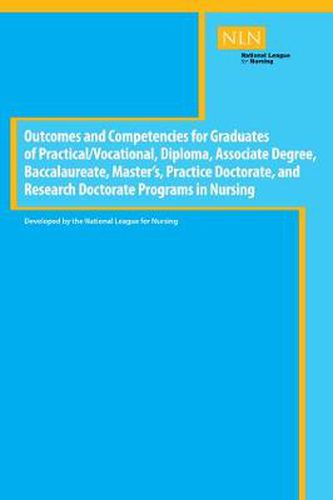Readings Newsletter
Become a Readings Member to make your shopping experience even easier.
Sign in or sign up for free!
You’re not far away from qualifying for FREE standard shipping within Australia
You’ve qualified for FREE standard shipping within Australia
The cart is loading…






Outcomes and Competencies for Graduates of Practical/Vocational, Diploma, Associate Degree, Baccalaureate, Master’s. Practice Doctorate, and Research Doctorate Programs in Nursing, is a first-of-its-kind report by the NLN Education Competency Work Group, which collaborated over a two-year period to evaluate how best to prepare graduates of nursing programs across the academic spectrum to function in an evolving, dynamic health care environment. This document lays the foundation for ensuring that all United States nursing programs can expand and develop while maintaining the highest standards of quality and excellence. Nurse educators examined program outcomes and competencies across all types of programs - rather than looking at each program type in isolation from others, as has been the case. Such a wide- ranging, inclusive approach serves to clarify concepts that cut across all program types while clarifying the unique focus of each program type in relation to each concept. The group from education and practice, therefore, reviewed existing literature, work previously completed by NLN advisory councils and task groups, and emerging national concerns and initiatives to formulate outcomes and competencies. They vetted these with the nursing education community and finalized a set of outcomes and competencies that address all program types. The result is a comprehensive document that is both contemporary and futuristic and fills a gap in the existing body of scholarly research. It helps nurse educators to build curricula, further the science of nursing education, and expore and refine teaching, learning and evaluation. Call out boxes (often with clarifying quotes) give readers an easy way to find and understand the meaning of key concepts and terminology. Useful Appendices present supplemental content such as models, terminology, and subconcepts.
$9.00 standard shipping within Australia
FREE standard shipping within Australia for orders over $100.00
Express & International shipping calculated at checkout
Outcomes and Competencies for Graduates of Practical/Vocational, Diploma, Associate Degree, Baccalaureate, Master’s. Practice Doctorate, and Research Doctorate Programs in Nursing, is a first-of-its-kind report by the NLN Education Competency Work Group, which collaborated over a two-year period to evaluate how best to prepare graduates of nursing programs across the academic spectrum to function in an evolving, dynamic health care environment. This document lays the foundation for ensuring that all United States nursing programs can expand and develop while maintaining the highest standards of quality and excellence. Nurse educators examined program outcomes and competencies across all types of programs - rather than looking at each program type in isolation from others, as has been the case. Such a wide- ranging, inclusive approach serves to clarify concepts that cut across all program types while clarifying the unique focus of each program type in relation to each concept. The group from education and practice, therefore, reviewed existing literature, work previously completed by NLN advisory councils and task groups, and emerging national concerns and initiatives to formulate outcomes and competencies. They vetted these with the nursing education community and finalized a set of outcomes and competencies that address all program types. The result is a comprehensive document that is both contemporary and futuristic and fills a gap in the existing body of scholarly research. It helps nurse educators to build curricula, further the science of nursing education, and expore and refine teaching, learning and evaluation. Call out boxes (often with clarifying quotes) give readers an easy way to find and understand the meaning of key concepts and terminology. Useful Appendices present supplemental content such as models, terminology, and subconcepts.